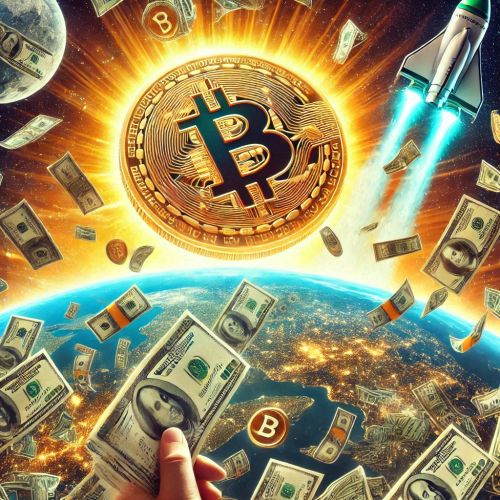
Signup for a Free Marketive account and get some Free Crypto - Use Promo Code - FRMEYfAluu4p1ydZ

The cryptocurrency officially reached six figures on Wednesday night, shortly after the president-elect announced his intention to appoint cryptocurrency supporter Paul Atkins as the next chair of the Securities and Exchange Commission.
Bitcoin dipped below $102,000 by midday Thursday, yet its value remains nearly 7% higher over the past day. Even amid a substantial rally that has more than doubled bitcoin's value this year, some experts continue to caution about investment risks associated with the asset, which has a notably volatile past.
Here's what you need to know.
Let's recap. What exactly is cryptocurrency? Cryptocurrency has been around for some time now. However, it is likely that awareness of it has increased in recent years.
In basic terms, cryptocurrency is digital currency. This form of money is designed to operate through an online network without a central authority—meaning it is typically not backed by any government or financial institution—and transactions are recorded using technology known as blockchain.
Bitcoin is the largest and oldest cryptocurrency, although other assets like Ethereum, XRP, Tether, and Dogecoin have also gained popularity over the years. Some investors view cryptocurrency as a "digital alternative" to traditional currency, yet the vast majority of everyday financial transactions are still conducted using fiat money such as the dollar. Additionally, bitcoin can be highly volatile, with its price dependent on broader market conditions.
Why is bitcoin rising? Much of the recent activity is related to the outcome of the U.S. presidential election.
Trump, who was once skeptical of crypto, has pledged to make the U.S. "the crypto capital of the world" and establish a "strategic reserve" of bitcoin. His campaign accepted cryptocurrency donations, and he engaged supporters at a bitcoin conference in July. He also launched World Liberty Financial, a new venture with relatives to trade cryptocurrencies.
On Thursday morning, hours after bitcoin surpassed the $100,000 mark, Trump congratulated "BITCOINERS" on his social media platform Truth Social. He also seemed to take credit for the recent rally, stating, "YOU'RE WELCOME!!!".
Leading crypto figures welcomed Trump's election victory last month, hoping he would be able to advance legislative and regulatory changes they have long advocated for—which generally aim for enhanced legitimacy without excessive bureaucracy.
Trump moved in that direction on Wednesday when he announced his intention to nominate Atkins to chair the SEC. Atkins was an SEC commissioner during George W. Bush's presidency. Since leaving the agency, Atkins has argued against excessive market regulation. He joined the Token Alliance, a cryptocurrency advocacy group, in 2017.
Under the leadership of the current chair, Gary Gensler, who will vacate his position when Trump assumes office, the SEC has taken stringent actions against the cryptocurrency industry, penalizing several firms for violations of securities regulations. Gensler has also faced significant criticism from industry participants during this period.
One favorable move towards cryptocurrency that the SEC undertook under Gensler's tenure was the approval of spot bitcoin ETFs, or exchange-traded funds, in January. These funds allow investors to gain exposure to bitcoin without purchasing it directly. Before Trump's victory, spot ETFs were the primary drivers of bitcoin's price, but they experienced record inflows following the election, much like the recent momentum in the crypto market.
What does bitcoin reaching the $100,000 milestone signify? Can it continue its upward trajectory? Bitcoin surpassing the significant $100,000 threshold has generated considerable excitement within the cryptocurrency community.
"What we are witnessing is not merely a rally; it represents a fundamental transformation of bitcoin's role within the financial system," stated Nathan McCauley, CEO and founder of Anchorage Digital, a crypto asset management firm, in a statement. He highlighted the increasing participation in the market, particularly with the growing institutional adoption.
Nevertheless, some caution that the new peaks in bitcoin's price do not necessarily indicate that the asset is becoming mainstream. The $100,000 mark is "simply a psychological milestone and ultimately just a number," wrote Dan Coatsworth, an investment analyst at the British investment firm AJ Bell, in a commentary on Thursday.
That being said, bitcoin could continue to achieve more all-time highs, especially if Trump follows through on his promises for more crypto-friendly policies once in office. For instance, if Trump establishes a bitcoin reserve, changes in supply could also propel the price forward.
However, as with everything in the unpredictable world of cryptocurrency, the future remains uncertain. Global regulatory uncertainties and environmental concerns related to bitcoin "mining"—the process of creating new bitcoin, which consumes significant energy—are among the factors that experts like Coatsworth note could impede future growth. Additionally, as a relatively young asset with a history of volatility, long-term adoption has yet to be fully realized.
Is it too late to invest? What are the risks? The current excitement surrounding bitcoin may entice many who are not yet involved in the space to join the action, but experts continue to emphasize caution regarding crypto "FOMO," or the fear of missing out, particularly for investors with limited resources.
"Many individuals have become wealthy from the cryptocurrency's soaring value this year, yet this high-risk asset is not suitable for everyone," Coatsworth noted on Thursday. "It is volatile, unpredictable, and driven by speculation, none of which make for a secure investment."
In other words, history shows that one can lose money in crypto as quickly as one has gained it. Long-term price behavior depends on broader market conditions. Trading occurs around the clock, every day.
Coatsworth references recent research from the Bank for International Settlements, a Switzerland-based international organization of central banks, which found that approximately three-quarters of retail customers using crypto exchange applications likely lost money on their bitcoin investments between 2015 and 2022.
When the COVID-19 pandemic began, bitcoin was valued slightly above $5,000. By November 2021, its value surged to nearly $69,000 amid a strong demand for innovative assets. However, it plummeted following aggressive interest rate hikes by the Federal Reserve. The collapse of FTX in late 2022 further eroded confidence in the cryptocurrency sector, causing bitcoin to fall below $17,000.
Investors began to return in significant numbers as inflation showed signs of easing. Gains accelerated due to the anticipation and initial success of spot ETFs, and once more, following the post-election excitement. Yet, the anticipated lighter regulation from the incoming Trump administration could potentially mean fewer safeguards.
"I would advise keeping things straightforward. Avoid taking on more risk than manageable," Adam Morgan McCarthy, a research analyst at Kaiko, previously mentioned to The Associated Press. He emphasized that there is no "magic eight ball" to predict with certainty what the future holds.
Thank You,
Kevin Jacobson
https://markethive.com/internetmarketingproteam
